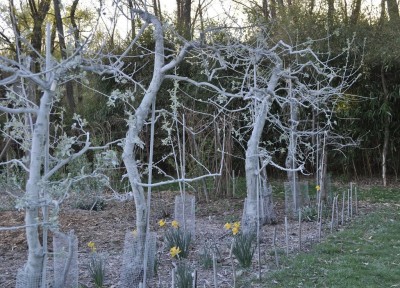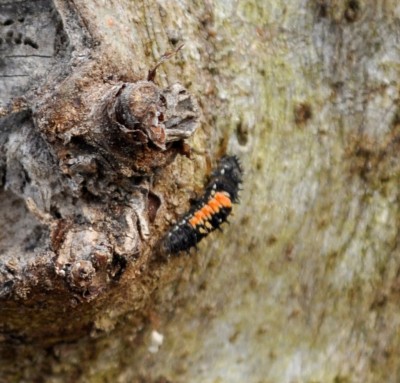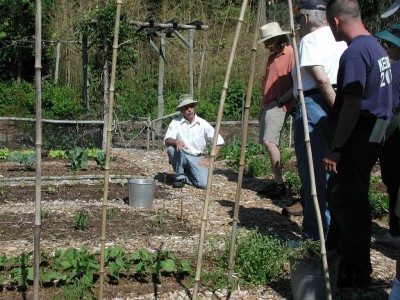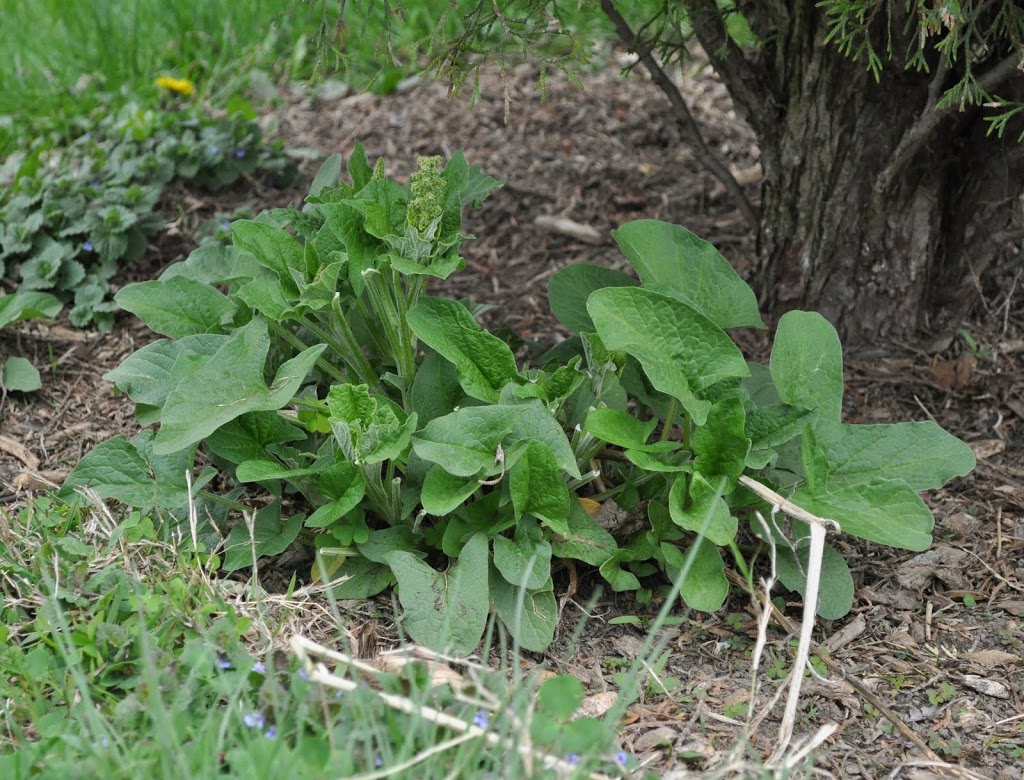[surround, grnhs ladybugs, nematodes}
This evening my apple trees were suddenly shrouded in a ghost-like pallor. It was all my doing and all for their own good. The transformation was the result of my spraying the trees with a suspension of white, kaolin clay.

That clay is a commercial product, marketed as Surround and made for organic control of various pests. The pest that I’m targeting is a cute but devastating little creature called the plum curculio. As you might guess from its name, plum curculios also attack plums, as well as peaches, nectarines, apricots, and cherries. Do nothing to thwart the ‘curc’, and, depending on the season, you could end up with no apples. Zip. Nada. Rien.
I’ve used Surround unsuccessfully for many years. The stuff has to be applied repeatedly in order to be effective, every 7 to 10 days, more if it rains. Done. What I didn’t learn until recently, though, is that the trees need their dusty, white coating to be thick and in place before the first curculios poke their heads out of nearby woods. Today was the third time I layered a coating on each tree from top to bottom.
Around here, plum curculios are little threat after the third week of June, so that’s about when I will stop spraying Surround. Then other pests awaken to threaten the crop. I have other organic tricks up my sleeve for them.
———————————————–
On the pest front in the greenhouse, ladybugs are happily at work gorging on aphids. These are the ladybugs that were clustering on warm days on the inside of one of the windows in my house. Daily, I dust-busted them up and then tipped them out of the Dust-Buster all around the inside of the greenhouse.

The ladybugs have also been happily at play. I caught a couple in flagrante delicto on the water spigot in the greenhouse. The result, of course: a lot of baby ladybugs. Baby ladybugs have themselves been foraging in the greenhouse for aphids and other delectables.
Young ladybugs are cute and look nothing like the adults. They have the same red and black colors but painted on in a different pattern. And their shape is more like that of crocodiles. Bon apetit young ‘uns.
——————————————-
I’m enlisting yet other creatures – nematodes — for natural pest control out in the garden.
Most gardeners find radishes are quick and easy to grow. Not me. Mine typically get attacked by root borers that riddle too many of the crunchy, white roots with disgusting, brown tunnels. These same borers attack some of my turnips in autumn.
Enter nematodes, tiny worms that are barely visible to the naked eye, to the rescue. Some nematodes attack plants and some attack plant pests. Some that attack plant pests are not practical to press into service because they’re too hard or too expensive to mass produce, or they attack insects of little importance as pests, or they’re just not sufficiently virulent. Steinernema, which arrived in the mail last week in a sealed paper cup, kills many plant pests and is relatively easy to mass produce, ship, and apply.
Insect death by Steinernema nematodes is indirect. The nematode wiggles its way into whatever opening it can find in an insect’s body and, once there, releases a symbiotic bacteria from its gut. It’s that bacteria that does the killing, and it does so quickly. The nematode then feasts on the bacteria and liquefying host insect and everyone is ready for another round.
In the next day or two, I’ll be opening my nematode package, mixing the contents with water in my sprinkling can, and watering a bed in which I’ll plant radishes, followed by bush beans, in turn followed by turnips.
With luck, conditions will be just right for the nematodes to get rid of my “boring” problems.

—————————————-
It’s still not to late to start a vegetable garden. I will be holding a workshop, VEGETABLE GARDENING 101, at my garden 2:30-5:30 pm on May 22, covering where, when, what, and how to plant, how to nurture the soil, timely harvest, and more. The cost is $35 paid before 5/18, $40 thereafter. Space is limited, so pre-registration is necessary. Contact me through my website for more information.




Good article, I do not have a radish or turnip problem. Still I should get some organic protection just to be safe.Thanks for the informive article .